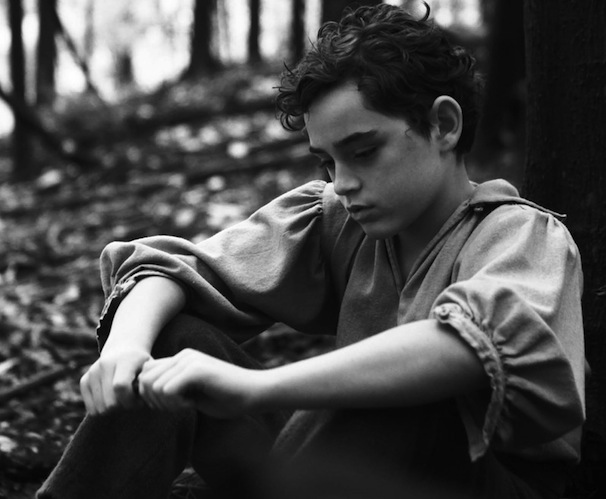Film Review: “The Better Angels” — Nurturing the Young Abe Lincoln
The most striking part of The Better Angels is its cinematography. The naked branches on the thick, gray trees are silhouetted against a sky that seems unable to hold sunlight.
By Paul Dervis
It isn’t often, but this time around a film’s producer, Terrence Malick, is getting more ink than the movie’s director, A. J. Edwards. The emphasis is understandable, given that Edwards was the editor on Malick’s latest film, 2012’s To the Wonder.
The Better Angels is Edwards’s first film as a director and it is very clearly his, but it has the undeniable look and sound of a Malick movie. From his first feature film, 1973’s Badlands, to 2011’s Brad Pitt, Sean Penn vehicle The Tree of Life, Malick has specialized in creating films that ignore conventional approaches to storytelling in order to emphasize stark and evocative visuals. His movies reflect the organic dictates of directorial consciousness rather than the demands of narrative mechanics.
And that is exactly how The Better Angels presents itself.
A participating film in this year’s Sundance Festival, Edwards’s films was a headliner in last week’s Bar Harbor Film Festival. Yes, it is yet another Abraham Lincoln film, but this time with a twist. It follows the trials and tribulations of the future President as a ten year-old living in the woods of Indiana. Shot in grainy black and white, the film captures the quiet loneliness of what was surely a Spartan existence. Young Lincoln, trapped in a chilly relationship with his austere father, is deeply dependent on his mother’s love. Clearly young Abe is intellectually special, a self-taught boy who is able to read ‘the Good Book’ to his religious mother. Yet his father, materialistic and strict, is disappointed in him.
Disease, brought on by fouled water, races through the family before finally taking Abraham’s sainted mother. The father leaves the children in the forest to fend for themselves, returning weeks later with a new wife and step-children. How will this work for Abe, so recently having lost his sole support in the family and now having her replaced by a widow with her own children to love and nurture?
Fortunately for Abe, it is as if his father’s choice of a new bride was being guided by the spirit of his deceased wife. Not only is Sarah Lincoln sympathetic to the boy, but she leads him through his difficult youth with (perhaps) even more love and concern than the first Mrs. Lincoln.
The narration, what there is of it, is spoken decades after the fact by a cousin who came to live with the family after his own parents had died. Yet he tells us only the bare facts, assuming most of the story is self evident, and in a way it is. We all know where this tale leads, so the film’s voiceover need only fill in the essentials. The monochrome of the visuals tell the deeper and more gripping story. The Better Angels is as much about a threatening time and place as it is about a future leader. The presence of morality is palpable in this film. It hovers over every scene. The images are cold, at times to the point of being quite frightening, yet they are still beautiful. The director creates a vivid picture of life on the provincial edge of 19th-century America, when even rural Indiana was as untamed as the west.
The cast is strong throughout, with particular kudos going to Braydon Denney as Abraham and Diane Kruger as Sarah. The cast focuses as much on physicality as on delivering the dialogue, creating an indelible vision of a harsh existence through a subtle look or movement, sometimes simply a limpid stillness.
The most striking part of The Better Angels is its cinematography. The naked branches on the thick, gray trees are silhouetted against a sky that seems unable to hold sunlight for long: a memorable depth of despair resonates powerfully through the film’s ninety minutes. That these characters can overcome such a dark blanket of melancholy is the point of this piece.
Edwards was clearly guided by the strong eye of Malick, but he was up to the task and has produced a compelling first effort.
Paul Dervis has been teaching drama in Canada at Algonquin College as well as the theatre conservatory Ottawa School of Speech & Drama for the past 15 years. Previously he ran theatre companies in Boston, New York, and Montreal. He has directed over 150 stage productions, receiving two dozen awards for hs work. Paul has also directed six films, the most recent being 2011′s The Righteous Tithe.
Tagged: A. J. Edwards, Abraham Lincoln, Paul Dervis, Terence Malick


